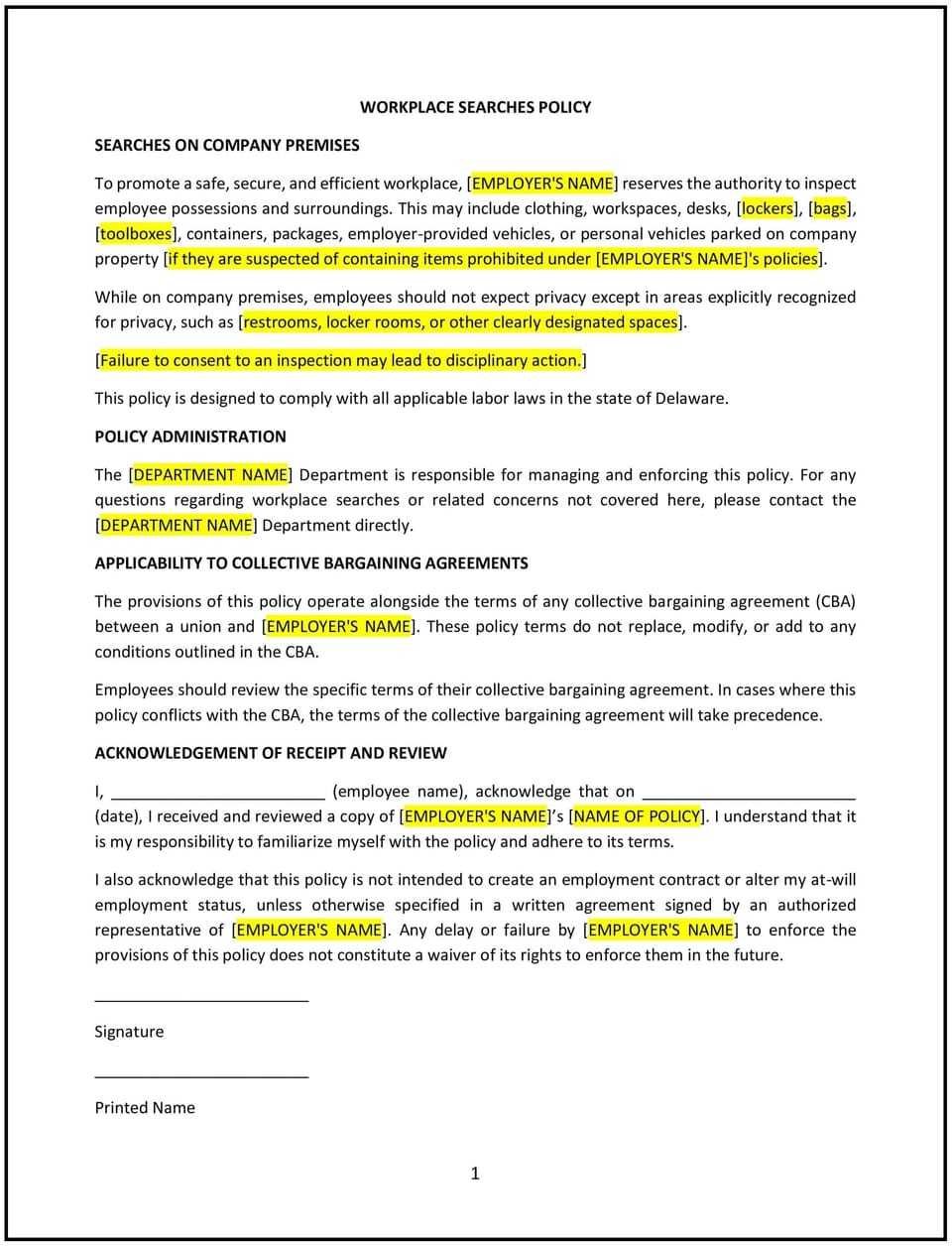Workplace searches policy (Delaware): Free template

Workplace searches policy (Delaware)
A workplace searches policy helps Delaware businesses establish clear guidelines for conducting searches of company property or employee workspaces to ensure safety, security, and compliance with company policies. This policy outlines the scope of permissible searches, employee rights, and procedures to maintain transparency and minimize legal risks.
By implementing this policy, businesses can safeguard workplace integrity while respecting employee privacy and adhering to Delaware labor laws.
How to use this workplace searches policy (Delaware)
- Define the scope of searches: Clearly specify what areas or items may be subject to searches, such as desks, lockers, company vehicles, and electronic devices.
- Clarify ownership: Emphasize that company-provided property, such as computers and email systems, is subject to company oversight and searches.
- Provide guidelines for conducting searches: Include procedures for initiating searches, such as requiring reasonable suspicion or prior approval from management.
- Respect employee privacy: Ensure that searches are conducted in a manner that minimizes invasions of privacy and maintains professionalism.
- Communicate employee rights: Outline the rights of employees during searches, such as being present during the search or having the option to refuse under specific circumstances.
- Document and monitor: Require documentation of all searches, including the reason for the search and any findings, to ensure accountability and transparency.
Benefits of using this workplace searches policy (Delaware)
This policy offers several benefits for Delaware businesses:
- Promotes workplace security: Deters theft, misconduct, or prohibited activities by clearly defining the company’s right to conduct searches.
- Protects employee rights: Balances company interests with respect for employee privacy and dignity.
- Ensures compliance: Aligns with Delaware and federal laws to minimize legal risks related to searches.
- Enhances transparency: Establishes clear guidelines and procedures to foster trust and prevent misunderstandings.
- Supports conflict resolution: Provides a structured approach to addressing security concerns or policy violations.
Tips for using this workplace searches policy (Delaware)
- Communicate the policy clearly: Ensure employees are aware of the policy and understand their rights and responsibilities.
- Train management: Provide training for supervisors and HR personnel on conducting searches lawfully and respectfully.
- Conduct searches consistently: Apply the policy uniformly to avoid perceptions of bias or discrimination.
- Maintain detailed records: Document the reasons for searches, the process followed, and the outcomes to ensure accountability.
- Update as needed: Revise the policy to reflect changes in Delaware laws, workplace practices, or industry standards.
Q: Why is a workplace searches policy important for my business?
A: This policy ensures workplace security, promotes transparency, and reduces legal risks by outlining clear procedures for conducting searches.
Q: What areas or items are subject to searches under this policy?
A: The policy typically covers company-owned property, such as desks, lockers, computers, and vehicles, and may include employee personal items if reasonable suspicion exists.
Q: How does this policy protect employee privacy?
A: Searches are conducted professionally, with minimal intrusion, and in accordance with legal requirements to balance security needs with employee rights.
Q: What documentation is required for workplace searches?
A: Searches should be documented with details such as the reason for the search, the items or areas searched, and the results to ensure transparency and accountability.
Q: How often should this policy be reviewed?
A: This policy should be reviewed annually or whenever Delaware laws, workplace security practices, or company procedures change to ensure continued compliance and effectiveness.
This article contains general legal information and does not contain legal advice. Cobrief is not a law firm or a substitute for an attorney or law firm. The law is complex and changes often. For legal advice, please ask a lawyer.


